Unit 11 How was your school trip? Section B (2a--2c) 课件(共32张PPT)
文档属性
| 名称 | Unit 11 How was your school trip? Section B (2a--2c) 课件(共32张PPT) | 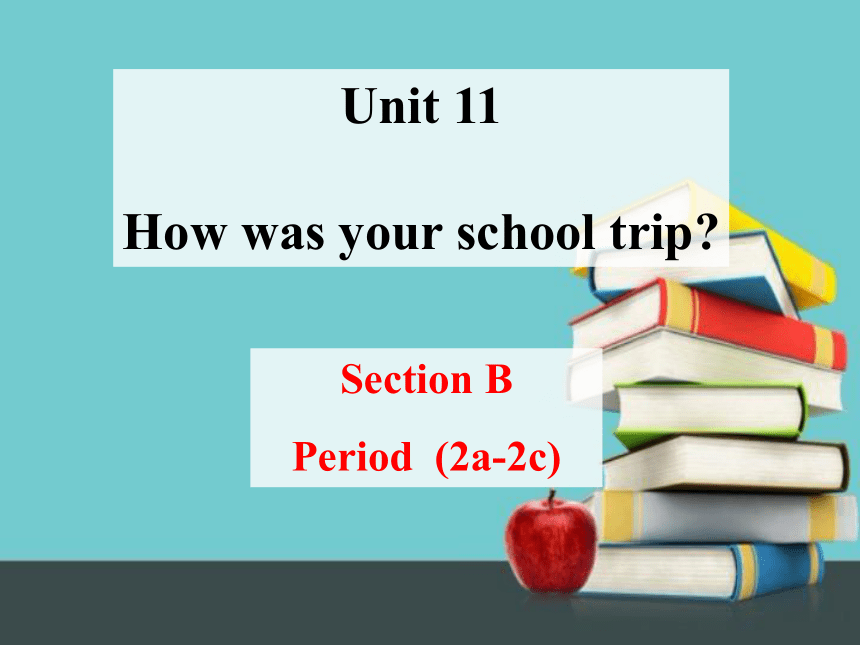 | |
| 格式 | zip | ||
| 文件大小 | 2.4MB | ||
| 资源类型 | 教案 | ||
| 版本资源 | 人教新目标(Go for it)版 | ||
| 科目 | 英语 | ||
| 更新时间 | 2020-07-10 13:30:46 | ||
图片预览

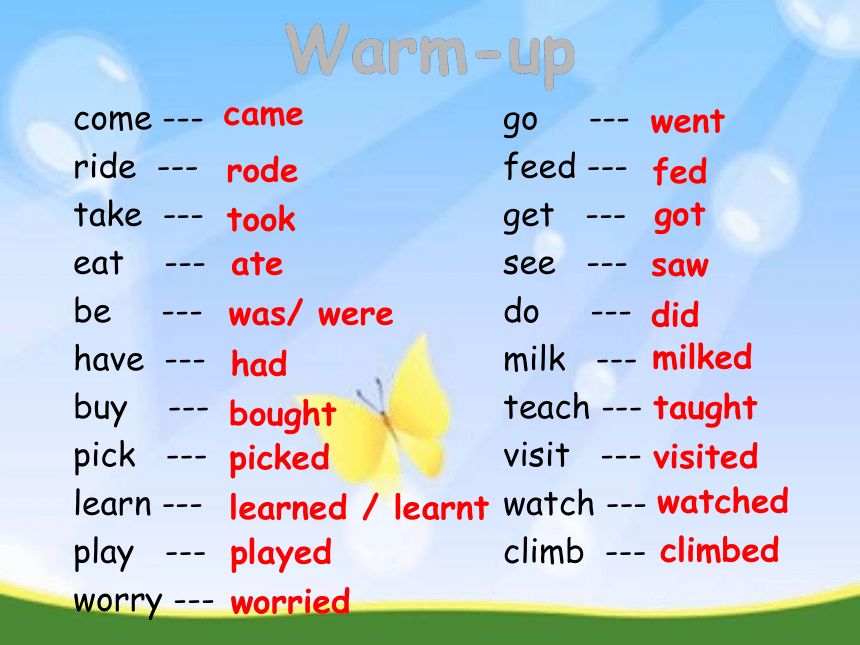
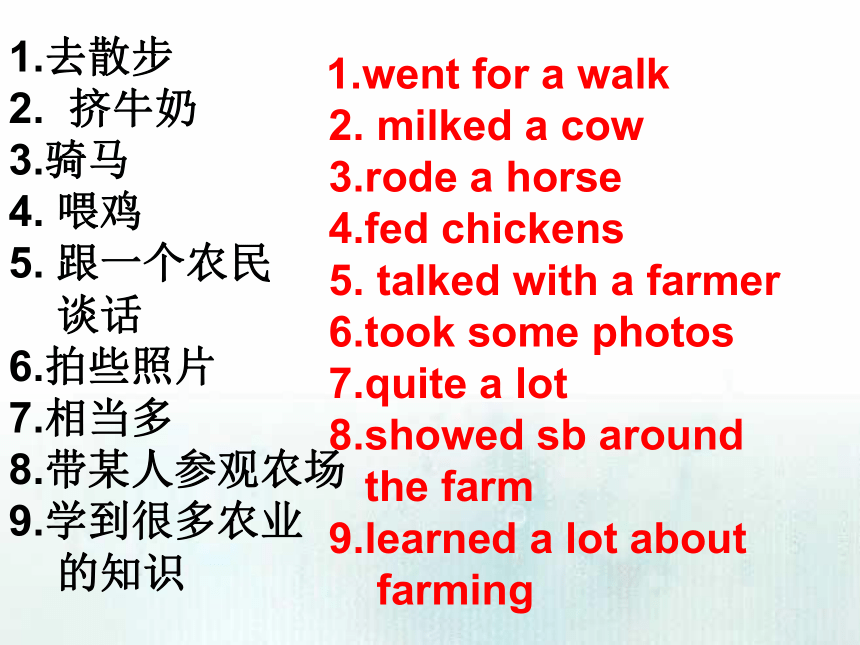
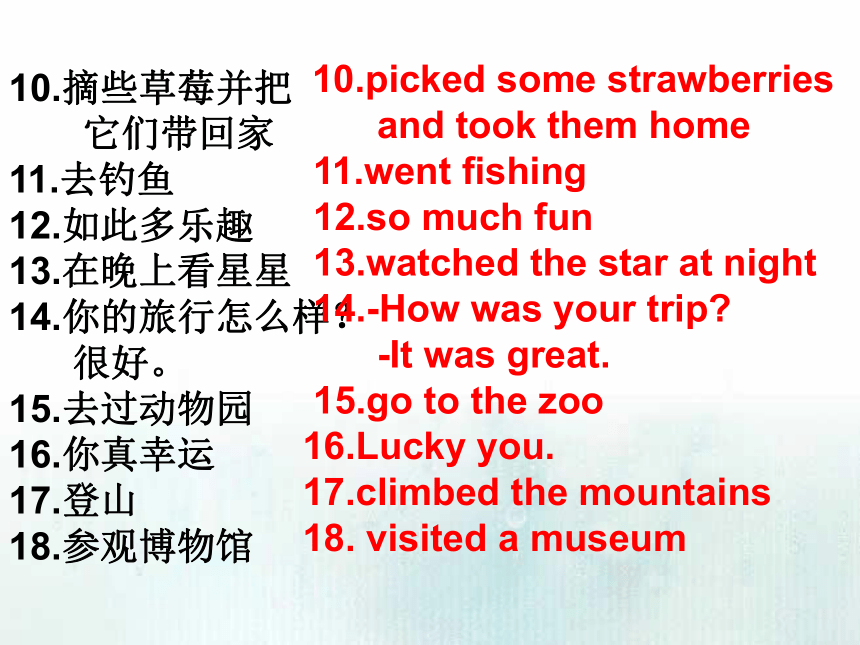
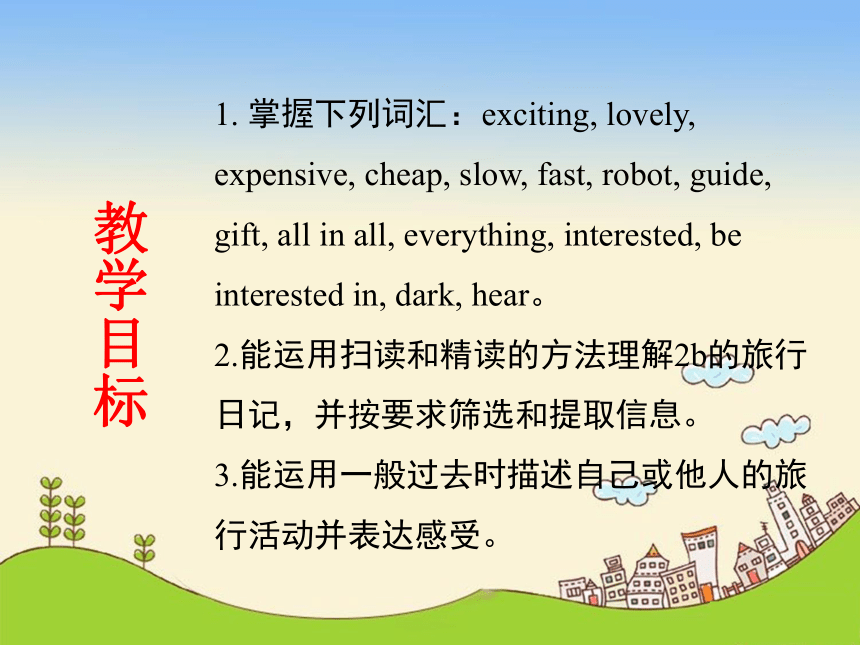
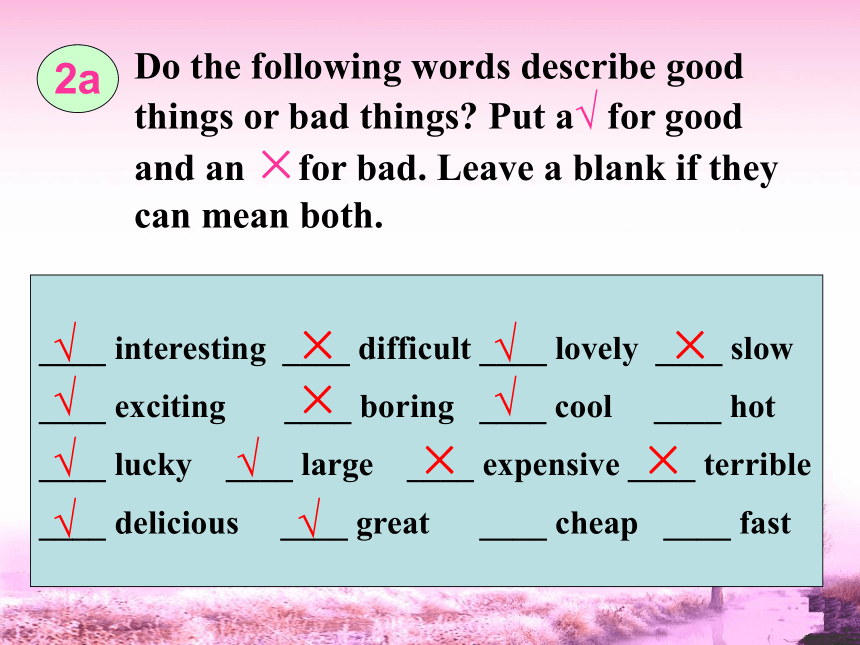
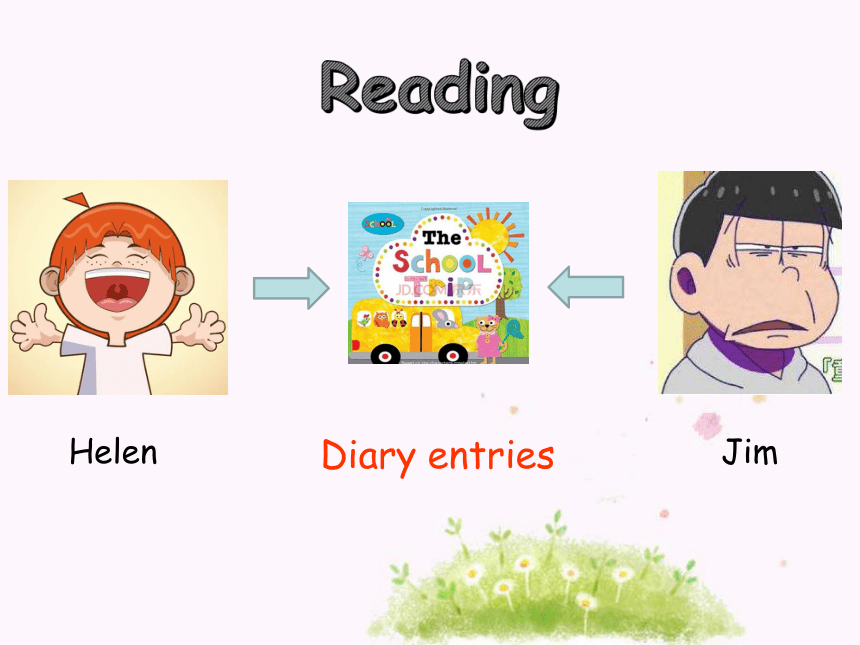
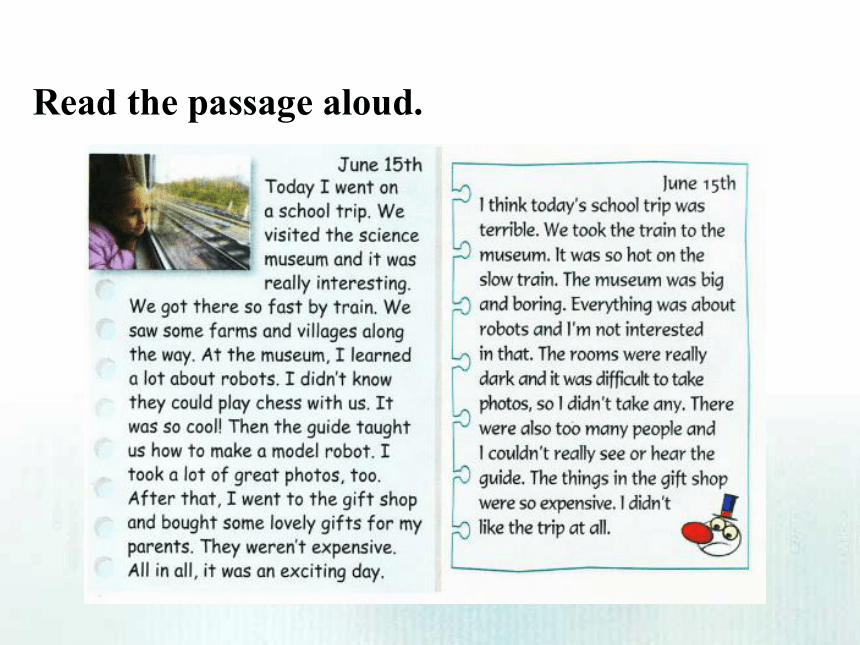
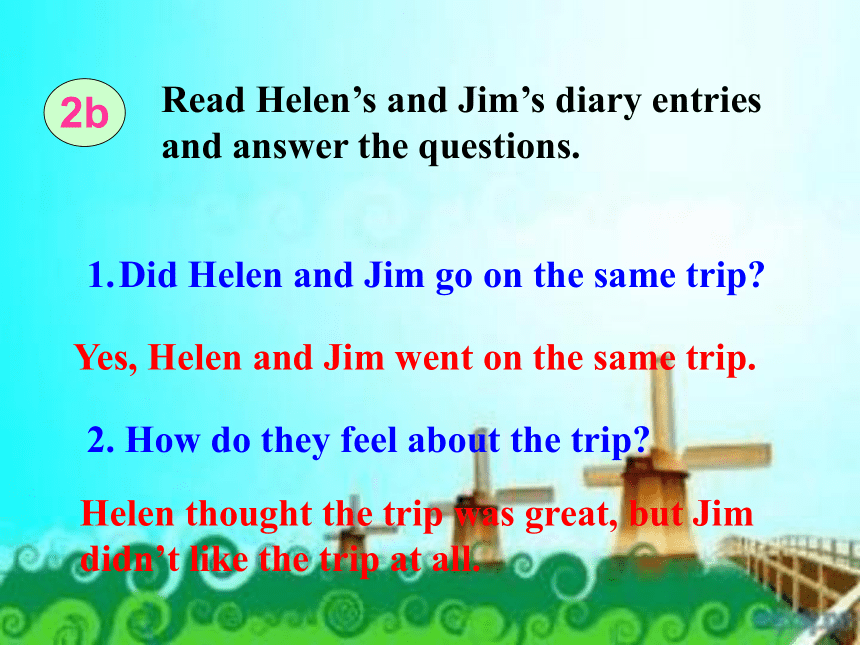
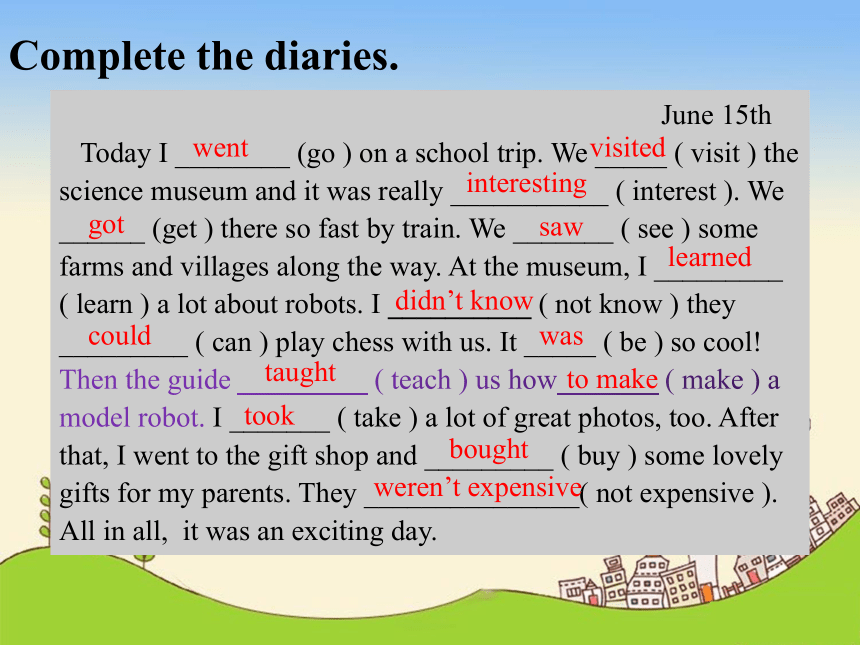
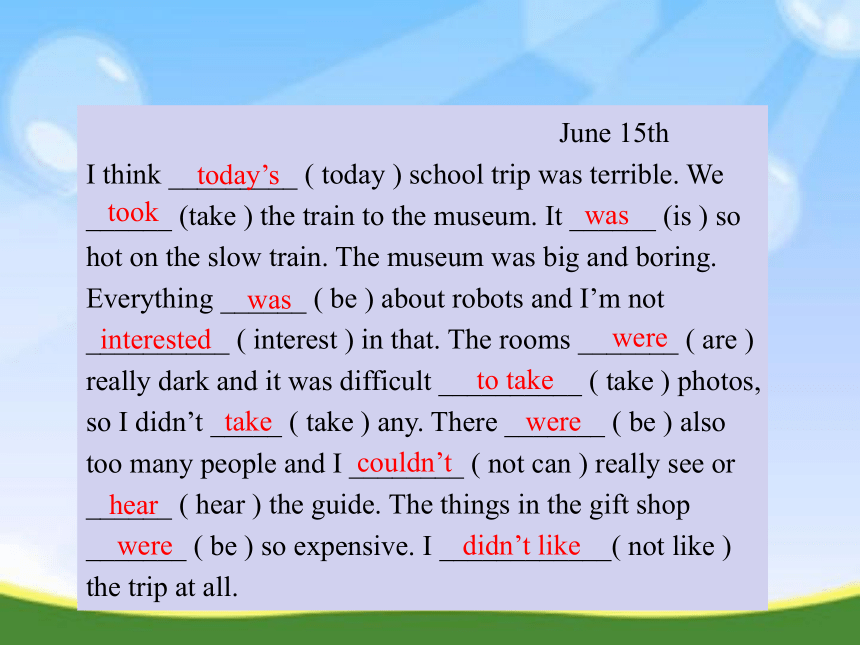
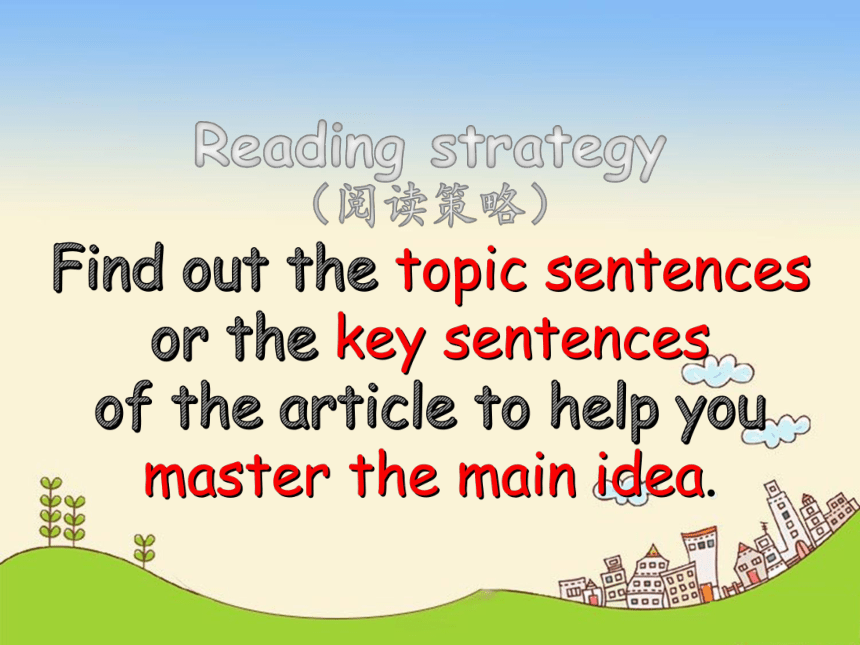
文档简介
(共32张PPT)
Unit
11
How
was
your
school
trip?
Section
B
Period
(2a-2c)
come
---
go
---
ride
---
feed
---
take
---
get
---
eat
---
see
---
be
---
do
---
have
---
milk
---
buy
---
teach
---
pick
---
visit
---
learn
---
watch
---
play
---
climb
---
worry
---
visited
watched
went
fed
got
saw
was/
were
did
had
milked
bought
taught
picked
learned
/
learnt
played
worried
climbed
came
rode
took
ate
Warm-up
1.去散步
2.
挤牛奶
3.骑马
4.
喂鸡
5.
跟一个农民
谈话
6.拍些照片
7.相当多
8.带某人参观农场
9.学到很多农业
的知识
1.went
for
a
walk
2.
milked
a
cow
3.rode
a
horse
4.fed
chickens
5.
talked
with
a
farmer
6.took
some
photos
7.quite
a
lot
8.showed
sb
around
the
farm
9.learned
a
lot
about
farming
10.摘些草莓并把
它们带回家
11.去钓鱼
12.如此多乐趣
13.在晚上看星星
14.你的旅行怎么样?
很好。
15.去过动物园
16.你真幸运
17.登山
18.参观博物馆
10.picked
some
strawberries
and
took
them
home
11.went
fishing
12.so
much
fun
13.watched
the
star
at
night
14.-How
was
your
trip?
-It
was
great.
15.go
to
the
zoo
16.Lucky
you.
17.climbed
the
mountains
18.
visited
a
museum
1.
掌握下列词汇:exciting,
lovely,
expensive,
cheap,
slow,
fast,
robot,
guide,
gift,
all
in
all,
everything,
interested,
be
interested
in,
dark,
hear。
2.能运用扫读和精读的方法理解2b的旅行日记,并按要求筛选和提取信息。
3.能运用一般过去时描述自己或他人的旅行活动并表达感受。
0
教学目标
Do
the
following
words
describe
good
things
or
bad
things?
Put
a√
for
good
and
an
×for
bad.
Leave
a
blank
if
they
can
mean
both.
2a
____
interesting
____
difficult
____
lovely
____
slow
____
exciting
____
boring
____
cool
____
hot
____
lucky
____
large
____
expensive
____
terrible
____
delicious
____
great
____
cheap
____
fast
√
√
√
√
√
√
√
√
×
×
×
×
×
Helen
Jim
Diary
entries
Reading
Read
the
passage
aloud.
2b
Read
Helen’s
and
Jim’s
diary
entries
and
answer
the
questions.
Did
Helen
and
Jim
go
on
the
same
trip?
2.
How
do
they
feel
about
the
trip?
Yes,
Helen
and
Jim
went
on
the
same
trip.
Helen
thought
the
trip
was
great,
but
Jim
didn’t
like
the
trip
at
all.
Complete
the
diaries.
0
June
15th
Today
I
________
(go
)
on
a
school
trip.
We
_____
(
visit
)
the
science
museum
and
it
was
really
___________
(
interest
).
We
______
(get
)
there
so
fast
by
train.
We
_______
(
see
)
some
farms
and
villages
along
the
way.
At
the
museum,
I
_________
(
learn
)
a
lot
about
robots.
I
__________
(
not
know
)
they
_________
(
can
)
play
chess
with
us.
It
_____
(
be
)
so
cool!
Then
the
guide
_________
(
teach
)
us
how_______
(
make
)
a
model
robot.
I
_______
(
take
)
a
lot
of
great
photos,
too.
After
that,
I
went
to
the
gift
shop
and
_________
(
buy
)
some
lovely
gifts
for
my
parents.
They
_______________(
not
expensive
).
All
in
all,
it
was
an
exciting
day.
went
visited
interesting
got
saw
learned
didn’t
know
could
was
taught
to
make
took
bought
weren’t
expensive
June
15th
I
think
_________
(
today
)
school
trip
was
terrible.
We
______
(take
)
the
train
to
the
museum.
It
______
(is
)
so
hot
on
the
slow
train.
The
museum
was
big
and
boring.
Everything
______
(
be
)
about
robots
and
I’m
not
__________
(
interest
)
in
that.
The
rooms
_______
(
are
)
really
dark
and
it
was
difficult
__________
(
take
)
photos,
so
I
didn’t
_____
(
take
)
any.
There
_______
(
be
)
also
too
many
people
and
I
________
(
not
can
)
really
see
or
______
(
hear
)
the
guide.
The
things
in
the
gift
shop
_______
(
be
)
so
expensive.
I
____________(
not
like
)
the
trip
at
all.
today’s
took
was
was
interested
were
to
take
take
were
couldn’t
hear
were
didn’t
like
Reading
strategy
(阅读策略)
Find
out
the
topic
sentences
or
the
key
sentences
of
the
article
to
help
you
master
the
main
idea.
Careful
reading
&
Mind
map
Helen's
idea
Jim's
idea
The
train
was
_______.
The
train
was
_______.
She
learned
_______
about
_______.
She
bought
some
______.
They
were
______
and
cheap.
He's
not
_______
in
robots.
The
rooms
were
very
______
and
there
were
________
people.
The
gifts
were
so
________.
The
trip
to
the
________
museum
interesting
&
exciting
terrible
&
boring
fast
slow
a
lot
interested
robots
dark
gifts
lovely
too
many
expensive
2c
Complete
the
chart.
How
do
Helen
and
Jim
describe
these
things?
Helen
Jim
the
trip
the
train
the
museum
the
gift
shop
and
gifts
exciting
fast
really
interesting
lovely,
not
expensive
terrible
slow
big,
boring,
dark,
too
many
people
so
expensive
Read
the
diary
entries
again,
then
try
to
find
out
the
following
phrases.
参加学校郊游
沿途
教我们怎么制作机器人
为某人买某物
5.总的来说
6.对……感兴趣
7.我真的听不见导游的解说
8.一点儿也不喜欢这次郊游
go
on
a
school
trip
along
the
way
teach
us
how
to
make
robots
buy
sth.
for
sb.
all
in
all
be
interested
in
(doing)
sth.
I
couldn’t
really
hear
the
guide.
I
didn’t
like
the
trip
at
all.
Language
points
All
in
all,
it
was
an
exciting
day.
总之,这是令人兴奋的一天。
all
in
all
相当于汉语中的“总的说来;总之;
整体上说”,用来对所阐述的内容进行概括性总
结及归纳。例如:
All
in
all,
I
think
you
did
a
good
job.
总的说来,我认为你干得很好。
how
to
I
don't
know
how
to
spell
the
word.
The
main
problem
is
how
to
finish
the
work
on
time.
how
to:疑问词+动词不定式(短语),可充当主、宾、表等。
还能用这些疑问词:
what,which,who,whose,when,
where,how,why
我不知道如何拼写这个单词。
主要问题是如何按时完成工作。
Exercise:
1.She
didn't
know
which
bus
_______(take).
2.Can
yo
tell
me
when_______(start)?
to
take
to
start
Everything
was
about
robots
and
I’m
not
interested
in
that.
每个东西都是关于机器人的,我对此不感
兴趣。
be
interested
in
对……感兴趣
例如:
We
are
interested
in
English.
我们对英语感兴趣。
interest/
interesting/
interested
That
is
an
interesting
film.
adj.感兴趣的
adj.有趣的
n.兴趣
be
interested
in
sth/doing
sth.
take
an
interest
in.....
He
is
interested
in
playing
football.
He
takes
an
interest
in
reading.
用interesting
/
interested
填空。
1.
The
book
is
very
_________.
Most
of
the
teachers
are
_________in
it.
2.
The
boy
has
much
_________
in
drawing.
3.
3岁的时候,他开始对音乐产生了兴趣。
He
______
_________
_______music
when
he
was
3
years
old.
interesting
interested
interested
was
interested
in
I
didn’t
like
the
trip
at
all.
我一点都不喜欢这次行程。
not
at
all
/
not…
at
all
意思是“根本不;完全不”。例如:
I
don’t
like
mutton
at
all.
我一点都不喜欢羊肉。
She’s
not
at
all
good
at
badminton.
她完全不擅长打羽毛球。
not.....at
all
not...at
all
根本不;一点也不
否定词not与be动词、情态动词或助动词连用,at
all一般位于句尾。
-Thank
you
very
much.
-Not
at
all.
-I‘m
sorry
to
keep
you
waiting.
-Oh,not
at
all.
回答感谢,“不客气”。
回答抱歉,“没关系”。
hear
“听见”
e.g.
They
heard
the
boy
singing
in
the
classroom.
hear
sb.
doing…
听见某人正在……
I
often
hear
them
talk
on
the
phone.
hear
sb.
do…
听见某人经常……
他们听见那个男孩正在教室里唱歌。
我经常听见他们通过电话交流。
“一听
(hear)
两看(watch,
see)
一发现
(find)”
hear
1.
到达那儿
2.
下棋
弹钢琴
打篮球
3.
对……感兴趣
4.
总之
5.
根本不
get
there
play
chess
play
the
piano
play
basketball
be
interested
in
all
in
all
not
…at
all
I.翻译下列短语和句子。
课后检测
today’s
school
trip
too
many
people
too
much
water
6.
今天的学校旅行
7.
太多人
太多水
8.
学英语对我来说很容易。
9.
上周胡老师教我如何下棋。
It
is
easy
for
me
to
learn
English.
Last
week
Mr.
Hu
taught
me
how
to
play
chess.
II.根据句意及提示写单词。
1.John
visited
the
(博物馆)yesterday.
2.The
(火)station
is
across
from
the
hospital.
3.Mr.Black
has
a
lot
of
(油画)
4.Yesterday
he
a
lot
of
beautiful
pictures.
5.Last
week
we
horses
in
the
zoo.
rode
drew
paintings
fire
museum
III.用所给词的适当形式填空。
1.
(do)
they
(go)
to
the
zoo
last
week?
—No,they
(watch)TV
at
home.
2.What
he
yesterday
evening?(do)
—He
(study)
for
the
math
test.
3.
We
(climb)
a
mountain
last
weekend.
What
about
you?
—I
(ride)
a
horse.
4.
Kate
her
homework
yesterdayevening?(do)
5.Sally
(not
study)
math
last
term.
Did
go
watched
did
do
studied
climbed
rode
Did
do
didn't_study
6.
Did
the
children
have
fun
________
(camp)?
7.
The
weather
_____
(be)
terrible
yesterday.
8.
Tony
doesn’t
want
________
(watch)
TV
with
his
grandmother.
9.
No
one
_____
(come)
to
the
concert
because
of
the
bad
weather.
10.
Last
Tuesday
Miss
Smith
_______
_______
(not
take)
a
class.
11.
How
was
your
______
____
(学校旅行),
Xiao
Ming?
camping
was
to
watch
came
didn’t
take
school
trip
12.
She
often
____
(go)
to
the
park
on
weekends,
but
yesterday
she
____
(go)
to
the
zoo.
13.
Last
week
she
___
(have)
fun
on
a
farm.
14.
What
___
they
__
(do)
on
the
school
trip?
They
____
(ride)
horses
and
_______
(climb)
the
mountains.
goes
went
had
did
do
rode
climbed
IV.按照要求完成句子,
每空一词。
1.
Peter
did
his
homework
last
night.
(改为否定句)
????
Peter
______
______
his
homework
last
night.
2.
There
were
some
children
in
the
park
just
now.(变一般疑问句,并进行否定回答)
??_____
there
______
children
in
the
park
just
now
didn’t
do
Were
any
3.
The
soccer
game
is
exciting.(对画线部分提问)
????
______
______
the
soccer
game?
4.
Kate
met
a
popular
actor
this
morning.
(同上)
????
______
______
Kate
______
this
morning?
5.
They
ate
some
bread
for
breakfast.
(同上)
????
______
______
they
______
for
breakfast?
What
did
eat
Who
did
meet
How
is
Homework
Written
work:
Write
a
short
passage
about
what
your
classmates
did
on
their
last
school
trip.
Unit
11
How
was
your
school
trip?
Section
B
Period
(2a-2c)
come
---
go
---
ride
---
feed
---
take
---
get
---
eat
---
see
---
be
---
do
---
have
---
milk
---
buy
---
teach
---
pick
---
visit
---
learn
---
watch
---
play
---
climb
---
worry
---
visited
watched
went
fed
got
saw
was/
were
did
had
milked
bought
taught
picked
learned
/
learnt
played
worried
climbed
came
rode
took
ate
Warm-up
1.去散步
2.
挤牛奶
3.骑马
4.
喂鸡
5.
跟一个农民
谈话
6.拍些照片
7.相当多
8.带某人参观农场
9.学到很多农业
的知识
1.went
for
a
walk
2.
milked
a
cow
3.rode
a
horse
4.fed
chickens
5.
talked
with
a
farmer
6.took
some
photos
7.quite
a
lot
8.showed
sb
around
the
farm
9.learned
a
lot
about
farming
10.摘些草莓并把
它们带回家
11.去钓鱼
12.如此多乐趣
13.在晚上看星星
14.你的旅行怎么样?
很好。
15.去过动物园
16.你真幸运
17.登山
18.参观博物馆
10.picked
some
strawberries
and
took
them
home
11.went
fishing
12.so
much
fun
13.watched
the
star
at
night
14.-How
was
your
trip?
-It
was
great.
15.go
to
the
zoo
16.Lucky
you.
17.climbed
the
mountains
18.
visited
a
museum
1.
掌握下列词汇:exciting,
lovely,
expensive,
cheap,
slow,
fast,
robot,
guide,
gift,
all
in
all,
everything,
interested,
be
interested
in,
dark,
hear。
2.能运用扫读和精读的方法理解2b的旅行日记,并按要求筛选和提取信息。
3.能运用一般过去时描述自己或他人的旅行活动并表达感受。
0
教学目标
Do
the
following
words
describe
good
things
or
bad
things?
Put
a√
for
good
and
an
×for
bad.
Leave
a
blank
if
they
can
mean
both.
2a
____
interesting
____
difficult
____
lovely
____
slow
____
exciting
____
boring
____
cool
____
hot
____
lucky
____
large
____
expensive
____
terrible
____
delicious
____
great
____
cheap
____
fast
√
√
√
√
√
√
√
√
×
×
×
×
×
Helen
Jim
Diary
entries
Reading
Read
the
passage
aloud.
2b
Read
Helen’s
and
Jim’s
diary
entries
and
answer
the
questions.
Did
Helen
and
Jim
go
on
the
same
trip?
2.
How
do
they
feel
about
the
trip?
Yes,
Helen
and
Jim
went
on
the
same
trip.
Helen
thought
the
trip
was
great,
but
Jim
didn’t
like
the
trip
at
all.
Complete
the
diaries.
0
June
15th
Today
I
________
(go
)
on
a
school
trip.
We
_____
(
visit
)
the
science
museum
and
it
was
really
___________
(
interest
).
We
______
(get
)
there
so
fast
by
train.
We
_______
(
see
)
some
farms
and
villages
along
the
way.
At
the
museum,
I
_________
(
learn
)
a
lot
about
robots.
I
__________
(
not
know
)
they
_________
(
can
)
play
chess
with
us.
It
_____
(
be
)
so
cool!
Then
the
guide
_________
(
teach
)
us
how_______
(
make
)
a
model
robot.
I
_______
(
take
)
a
lot
of
great
photos,
too.
After
that,
I
went
to
the
gift
shop
and
_________
(
buy
)
some
lovely
gifts
for
my
parents.
They
_______________(
not
expensive
).
All
in
all,
it
was
an
exciting
day.
went
visited
interesting
got
saw
learned
didn’t
know
could
was
taught
to
make
took
bought
weren’t
expensive
June
15th
I
think
_________
(
today
)
school
trip
was
terrible.
We
______
(take
)
the
train
to
the
museum.
It
______
(is
)
so
hot
on
the
slow
train.
The
museum
was
big
and
boring.
Everything
______
(
be
)
about
robots
and
I’m
not
__________
(
interest
)
in
that.
The
rooms
_______
(
are
)
really
dark
and
it
was
difficult
__________
(
take
)
photos,
so
I
didn’t
_____
(
take
)
any.
There
_______
(
be
)
also
too
many
people
and
I
________
(
not
can
)
really
see
or
______
(
hear
)
the
guide.
The
things
in
the
gift
shop
_______
(
be
)
so
expensive.
I
____________(
not
like
)
the
trip
at
all.
today’s
took
was
was
interested
were
to
take
take
were
couldn’t
hear
were
didn’t
like
Reading
strategy
(阅读策略)
Find
out
the
topic
sentences
or
the
key
sentences
of
the
article
to
help
you
master
the
main
idea.
Careful
reading
&
Mind
map
Helen's
idea
Jim's
idea
The
train
was
_______.
The
train
was
_______.
She
learned
_______
about
_______.
She
bought
some
______.
They
were
______
and
cheap.
He's
not
_______
in
robots.
The
rooms
were
very
______
and
there
were
________
people.
The
gifts
were
so
________.
The
trip
to
the
________
museum
interesting
&
exciting
terrible
&
boring
fast
slow
a
lot
interested
robots
dark
gifts
lovely
too
many
expensive
2c
Complete
the
chart.
How
do
Helen
and
Jim
describe
these
things?
Helen
Jim
the
trip
the
train
the
museum
the
gift
shop
and
gifts
exciting
fast
really
interesting
lovely,
not
expensive
terrible
slow
big,
boring,
dark,
too
many
people
so
expensive
Read
the
diary
entries
again,
then
try
to
find
out
the
following
phrases.
参加学校郊游
沿途
教我们怎么制作机器人
为某人买某物
5.总的来说
6.对……感兴趣
7.我真的听不见导游的解说
8.一点儿也不喜欢这次郊游
go
on
a
school
trip
along
the
way
teach
us
how
to
make
robots
buy
sth.
for
sb.
all
in
all
be
interested
in
(doing)
sth.
I
couldn’t
really
hear
the
guide.
I
didn’t
like
the
trip
at
all.
Language
points
All
in
all,
it
was
an
exciting
day.
总之,这是令人兴奋的一天。
all
in
all
相当于汉语中的“总的说来;总之;
整体上说”,用来对所阐述的内容进行概括性总
结及归纳。例如:
All
in
all,
I
think
you
did
a
good
job.
总的说来,我认为你干得很好。
how
to
I
don't
know
how
to
spell
the
word.
The
main
problem
is
how
to
finish
the
work
on
time.
how
to:疑问词+动词不定式(短语),可充当主、宾、表等。
还能用这些疑问词:
what,which,who,whose,when,
where,how,why
我不知道如何拼写这个单词。
主要问题是如何按时完成工作。
Exercise:
1.She
didn't
know
which
bus
_______(take).
2.Can
yo
tell
me
when_______(start)?
to
take
to
start
Everything
was
about
robots
and
I’m
not
interested
in
that.
每个东西都是关于机器人的,我对此不感
兴趣。
be
interested
in
对……感兴趣
例如:
We
are
interested
in
English.
我们对英语感兴趣。
interest/
interesting/
interested
That
is
an
interesting
film.
adj.感兴趣的
adj.有趣的
n.兴趣
be
interested
in
sth/doing
sth.
take
an
interest
in.....
He
is
interested
in
playing
football.
He
takes
an
interest
in
reading.
用interesting
/
interested
填空。
1.
The
book
is
very
_________.
Most
of
the
teachers
are
_________in
it.
2.
The
boy
has
much
_________
in
drawing.
3.
3岁的时候,他开始对音乐产生了兴趣。
He
______
_________
_______music
when
he
was
3
years
old.
interesting
interested
interested
was
interested
in
I
didn’t
like
the
trip
at
all.
我一点都不喜欢这次行程。
not
at
all
/
not…
at
all
意思是“根本不;完全不”。例如:
I
don’t
like
mutton
at
all.
我一点都不喜欢羊肉。
She’s
not
at
all
good
at
badminton.
她完全不擅长打羽毛球。
not.....at
all
not...at
all
根本不;一点也不
否定词not与be动词、情态动词或助动词连用,at
all一般位于句尾。
-Thank
you
very
much.
-Not
at
all.
-I‘m
sorry
to
keep
you
waiting.
-Oh,not
at
all.
回答感谢,“不客气”。
回答抱歉,“没关系”。
hear
“听见”
e.g.
They
heard
the
boy
singing
in
the
classroom.
hear
sb.
doing…
听见某人正在……
I
often
hear
them
talk
on
the
phone.
hear
sb.
do…
听见某人经常……
他们听见那个男孩正在教室里唱歌。
我经常听见他们通过电话交流。
“一听
(hear)
两看(watch,
see)
一发现
(find)”
hear
1.
到达那儿
2.
下棋
弹钢琴
打篮球
3.
对……感兴趣
4.
总之
5.
根本不
get
there
play
chess
play
the
piano
play
basketball
be
interested
in
all
in
all
not
…at
all
I.翻译下列短语和句子。
课后检测
today’s
school
trip
too
many
people
too
much
water
6.
今天的学校旅行
7.
太多人
太多水
8.
学英语对我来说很容易。
9.
上周胡老师教我如何下棋。
It
is
easy
for
me
to
learn
English.
Last
week
Mr.
Hu
taught
me
how
to
play
chess.
II.根据句意及提示写单词。
1.John
visited
the
(博物馆)yesterday.
2.The
(火)station
is
across
from
the
hospital.
3.Mr.Black
has
a
lot
of
(油画)
4.Yesterday
he
a
lot
of
beautiful
pictures.
5.Last
week
we
horses
in
the
zoo.
rode
drew
paintings
fire
museum
III.用所给词的适当形式填空。
1.
(do)
they
(go)
to
the
zoo
last
week?
—No,they
(watch)TV
at
home.
2.What
he
yesterday
evening?(do)
—He
(study)
for
the
math
test.
3.
We
(climb)
a
mountain
last
weekend.
What
about
you?
—I
(ride)
a
horse.
4.
Kate
her
homework
yesterdayevening?(do)
5.Sally
(not
study)
math
last
term.
Did
go
watched
did
do
studied
climbed
rode
Did
do
didn't_study
6.
Did
the
children
have
fun
________
(camp)?
7.
The
weather
_____
(be)
terrible
yesterday.
8.
Tony
doesn’t
want
________
(watch)
TV
with
his
grandmother.
9.
No
one
_____
(come)
to
the
concert
because
of
the
bad
weather.
10.
Last
Tuesday
Miss
Smith
_______
_______
(not
take)
a
class.
11.
How
was
your
______
____
(学校旅行),
Xiao
Ming?
camping
was
to
watch
came
didn’t
take
school
trip
12.
She
often
____
(go)
to
the
park
on
weekends,
but
yesterday
she
____
(go)
to
the
zoo.
13.
Last
week
she
___
(have)
fun
on
a
farm.
14.
What
___
they
__
(do)
on
the
school
trip?
They
____
(ride)
horses
and
_______
(climb)
the
mountains.
goes
went
had
did
do
rode
climbed
IV.按照要求完成句子,
每空一词。
1.
Peter
did
his
homework
last
night.
(改为否定句)
????
Peter
______
______
his
homework
last
night.
2.
There
were
some
children
in
the
park
just
now.(变一般疑问句,并进行否定回答)
??_____
there
______
children
in
the
park
just
now
didn’t
do
Were
any
3.
The
soccer
game
is
exciting.(对画线部分提问)
????
______
______
the
soccer
game?
4.
Kate
met
a
popular
actor
this
morning.
(同上)
????
______
______
Kate
______
this
morning?
5.
They
ate
some
bread
for
breakfast.
(同上)
????
______
______
they
______
for
breakfast?
What
did
eat
Who
did
meet
How
is
Homework
Written
work:
Write
a
short
passage
about
what
your
classmates
did
on
their
last
school
trip.
同课章节目录
- Unit 1 Can you play the guitar?
- Section A
- Section B
- Unit 2 What time do you go to school?
- Section A
- Section B
- Unit 3 How do you get to school?
- Section A
- Section B
- Unit 4 Don't eat in class.
- Section A
- Section B
- Unit 5 Why do you like pandas?
- Section A
- Section B
- Unit 6 I'm watching TV.
- Section A
- Section B
- Review of Units 1-6
- Unit 7 It's raining!
- Section A
- Section B
- Unit 8 Is there a post office near here?
- Section A
- Section B
- Unit 9 What does he look like?
- Section A
- Section B
- Unit 10 I'd like some noodles.
- Section A
- Section B
- Unit 11 How was your school trip?
- Section A
- Section B
- Unit 12 What did you do last weekend?
- Section A
- Section B
